19 Money Lies Your Mechanic Might Be Telling You

Car repairs can be stressful — and expensive. And if you end up going to a less-than-trustworthy mechanic, you might end up paying more than you have to.
Related: The 29 Biggest Car Mistakes That Will Cost You
See: The Most Expensive Car Repairs That Will Make You Want To Sell
If you have a tried-and-true mechanic, you should be able to take them at their word. But if you're trying a new place, read on to see which costly car repairs to watch out for.
Last updated: July 30, 2021
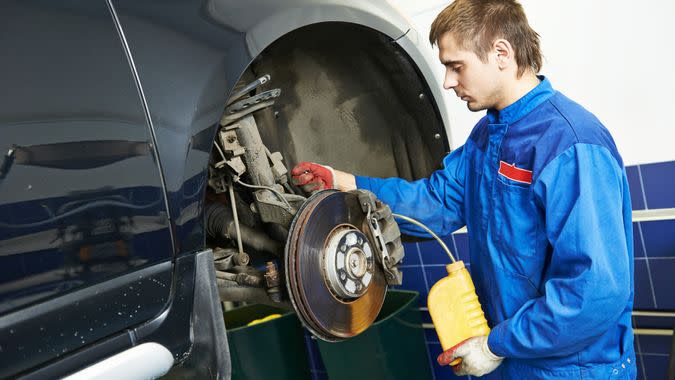
'Your Brake Fluid Needs To Be Changed'
A less trustworthy mechanic might tell you that you need to flush your brake fluid based on its color or smell. Sometimes they might be right, but a lot of the time it's just unnecessary work. Brake fluid typically needs to be changed only every two to three years, said Lauren Fix, The Car Coach.
"A simple brake fluid test strip can tell in seconds (if it needs to be flushed)," she said.
Find Out: 20 Ways You’re Damaging Your Car’s Trade-In Value
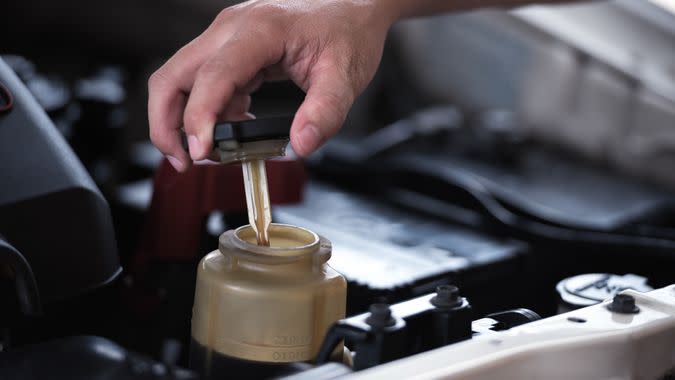
'Your Power Steering Fluid Needs To Be Flushed'
If a mechanic tells you it's time to flush your power steering fluid, take it with a grain of salt — and consider getting a second opinion. Mechanics might tell you that the smell or color of your power steering fluid is how they're able to tell it needs to be replaced, but generally, it only needs to be flushed once or twice during the lifetime of the car.
Hard Facts: Only 26% of Americans Feel Confident When Car Shopping
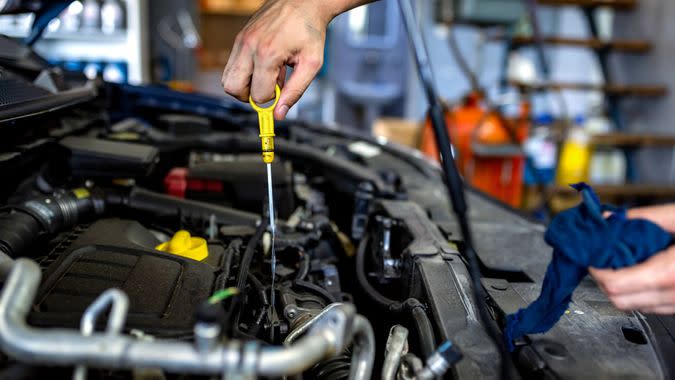
'You're Due For an Oil Change'
It used to be that you needed to change your oil every 3,000 miles. But newer cars that use full-synthetic oil can now go up to 15,000 miles without an oil change, according to AAA. That means some drivers might be able to go a full year without really needing to change the oil.
It's always best to consult your owner's manual to determine how many miles your car can typically go between oil changes.
Helpful Tips: 13 Things That Increase Your Car’s Value
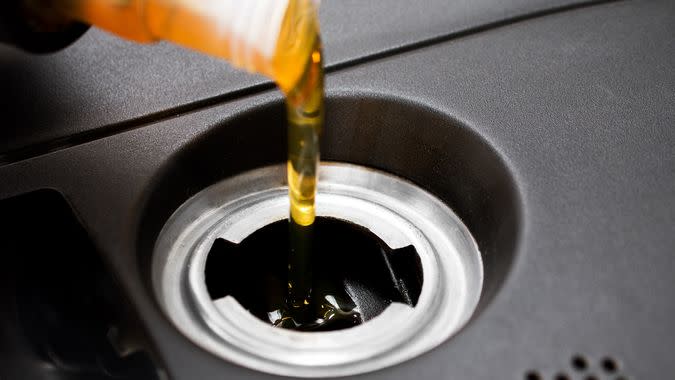
'You Should Use Synthetic Oil'
When you are due for your oil change, your mechanic might tell you to use synthetic oil, which is typically more expensive. There are some advantages to using synthetic oil. But you don't need to take on the added expense unless your car manual specifically states that you need it, according to Cars.com.
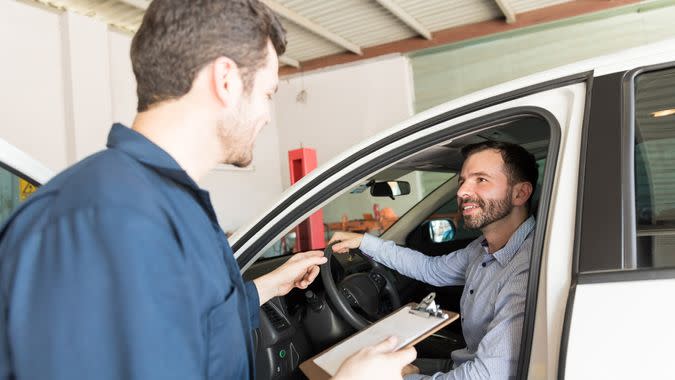
'I Recommend This Service Based on Your Mileage'
When you go in for an oil change, your mechanic might try to upsell you for other "dealer-recommended services" based on your mileage. Check that these services are actually recommended in your owner's manual first before agreeing to pay for anything extra.
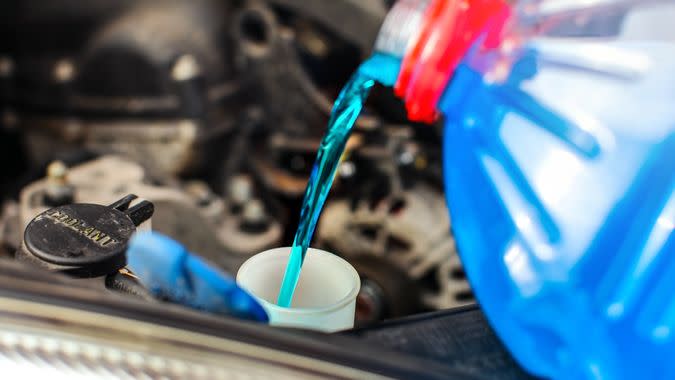
'Your Coolant Needs To Be Replaced'
If a mechanic tells you it's time to replace your car's coolant, be on guard. If your vehicle is relatively new or you recently had your coolant flushed, chances are you aren't due to have it replaced again. Coolant doesn't wear like oil does and only needs to be replaced maybe once or twice during the car's lifetime.
"Checking the life of coolant is as simple as a test strip," said Fix.
If you are due for a change and have long-life coolant, be sure to "never top off or mix the type of coolant, or you take away the long-life advantage," she said.
Your Money: Auto Expenses You Can Expect If You Haven’t Driven During Quarantine
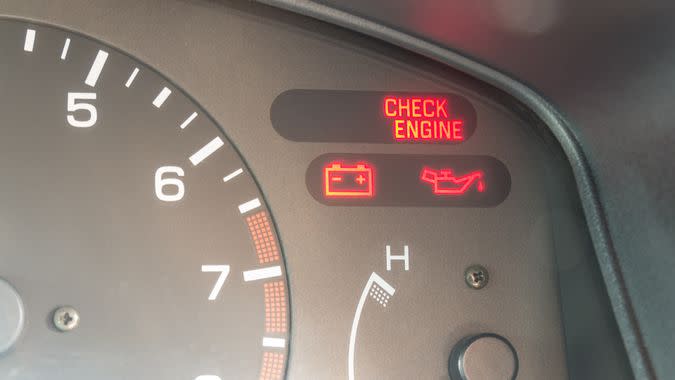
'You're Due for Your Regular Maintenance'
If you lease a car, you might get notifications from your dealer that you're due for a service checkup. However, if you're driving a newer car and your in-vehicle maintenance reminder system hasn't notified you that you're due for maintenance, there's probably no need to take it into the shop yet.
"Service should be based on mileage, not time," said Fix. "Some new cars include service -- take advantage of that if it does."
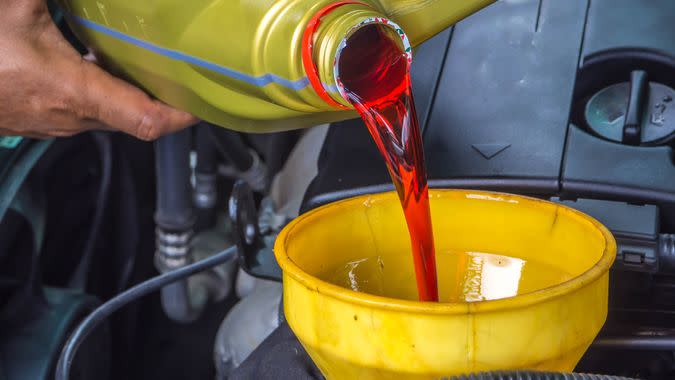
'Your Transmission Fluid Should Be Flushed'
Another typical upsell is the transmission flush, said Fidel Lerma, business manager at EBA Automotive Repair.
"It can be useful if you have been changing your transmission fluid regularly, on schedule," Lerma said. "The problem is most people don't, and doing a flush on a car with 100,000 miles and no previous fluid change, for example, may end up causing more problems. If they don't ask you about the service history and just recommend a flush, watch out."
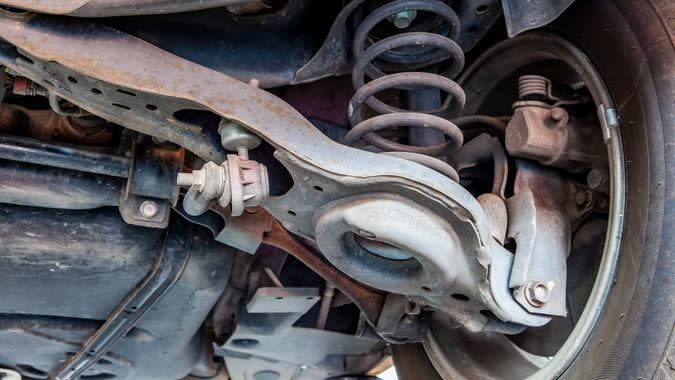
'Based on Your Car, You Should Get This Repair'
Some mechanics will make recommendations for service based on your car type. According to Consumer Reports, if your mechanic says something like, "Most Honda Pilots with as many miles as yours have bad control-arm bushings, so you better replace yours," it might be a scam. They should not be telling you what repairs to get without actually checking to see if your car really needs it.
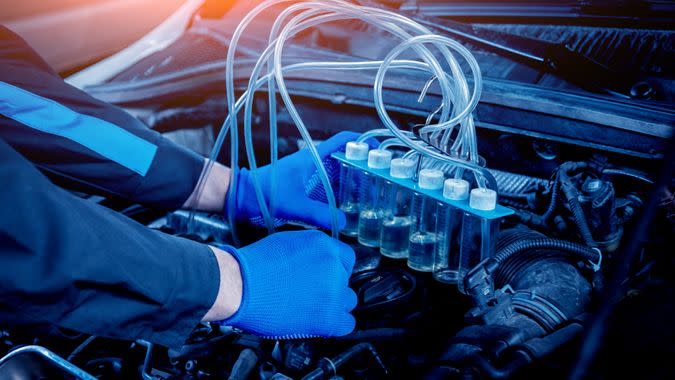
'You Need a Fuel Injection Cleaning'
When a mechanic recommends a fuel injection cleaning, make sure your vehicle truly needs it.
"If you use good quality gas, it's unlikely this service will bring any improvement," said Lerma. "If your car is running rough, there are almost certainly other problems causing it that should be dealt with first. Just like the transmission flush, if the shop pushes this, watch out."

'Your Car Is Unsafe To Drive'
When your mechanic scares you, you're more likely to shell out cash for repairs you might not need. As John Ibbotson, Consumer Reports' chief mechanic, told the site: "High scare equals high profit."
Be skeptical of scary statements, and ask the mechanic to explain why your car might be unsafe.
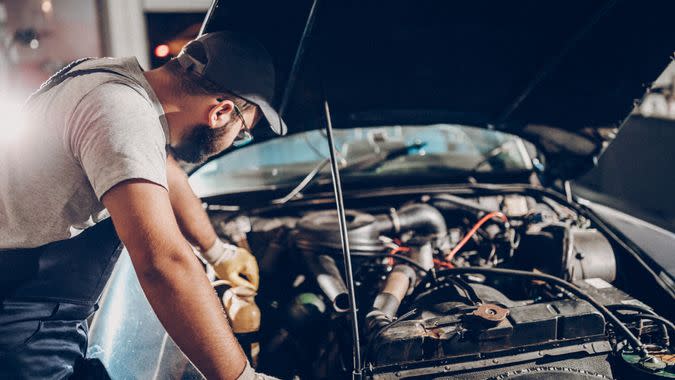
'Your Engine Needs To Be Flushed'
And engine flush sounds like a pretty big deal — but should you get one? Probably not.
"Don't get engine your flushed," said Fix. "This is an upsell that is never necessary."

'You Need New Brakes'
Your mechanic might suggest your entire braking system needs replacing. But it's more likely that you just need new brake pads, a cleaning or a turning of the brake rotors, according to Consumer Reports.
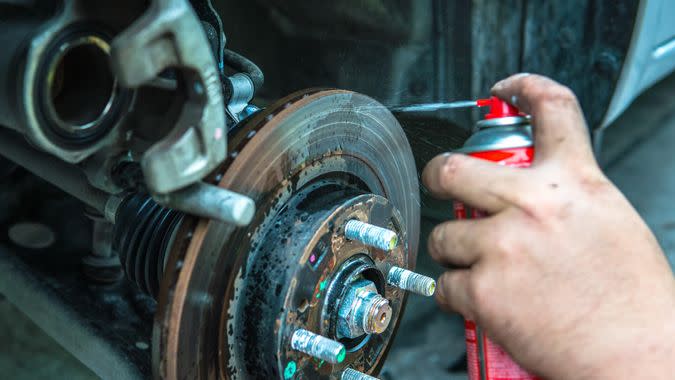
'Your Car Needs a Lubrication Service'
Most modern vehicles never require lube service, according to Firestone Complete Auto Care. Unless you have an older car and you notice that it's squeaking, don't let a mechanic convince you to pay for this service.

'Your Warranty Doesn't Cover This Repair'
If your mechanic says that your warranty covers only labor and not parts, double-check that this is really the case.
"Review the details of your warranty," said Frank Leutz, owner of Desert Car Care of Chandler in Chandler, Arizona. "Are both parts and labor covered? The standard in the industry is that both are covered."
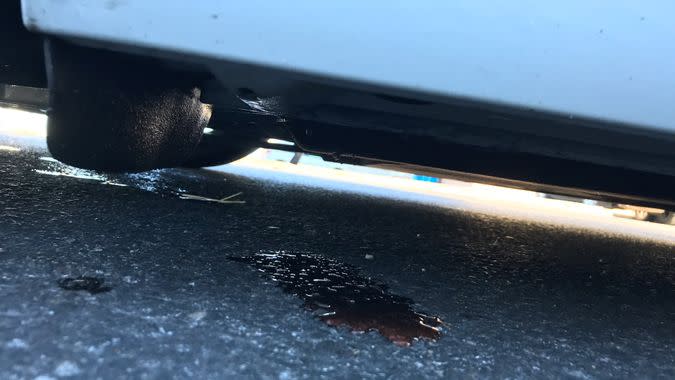
'Your Vehicle Has a Leak'
A truly shady mechanic will use coolant to fake a leak, so be on your guard. Ask to see exactly where the leak is coming from before you agree to pay for a costly radiator repair.
Don't Overpay on Other Items: How To Save Money on All Your Monthly Expenses and Bills
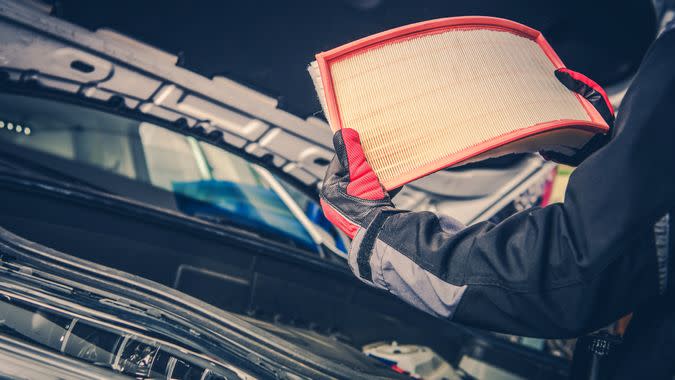
'Your Air Filter Is Dirty'
Just as a mechanic can fake a leak, a mechanic can fake a dirty air filter. Some mechanics will keep dirty air filters on hand to pass off as the customer's to get them to pay for a replacement, Angie's List reported.
To prevent yourself from getting scammed, make sure you know the filter is actually from your car. Also, find out how often your vehicle make and model typically needs an air filter replacement. Most cars can go 15,000 to 20,000 miles between replacements.
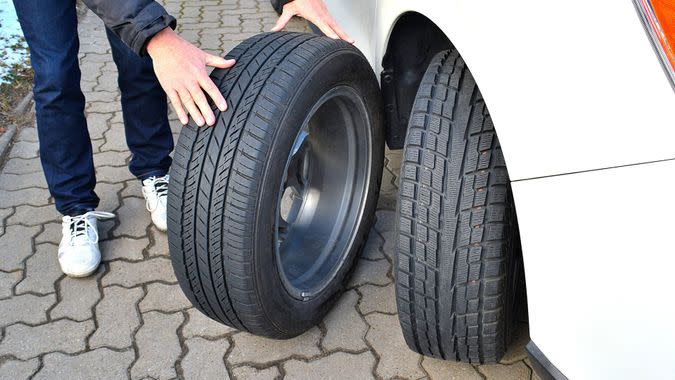
'These Are Brand New Tires'
Your mechanic might offer you a "deal" on brand new tires — but make sure they're actually new. A tire that's been sitting on a shelf for years, even if it hasn't been used, can be dangerous to drive on, according to Edmunds.
Tires get stamped with a four-digit code that shows the week and year it was manufactured. For example, a tire manufactured during the tenth week of 2019 would be stamped with the digits 1019. You shouldn't purchase a tire that's more than five or six years old.

'I Needed To Make Additional Repairs'
You take your car to the shop to address one issue. Then the shop calls you hours or days later, saying they found — and fixed — several other problems. Suddenly, you owe hundreds or even thousands more than you originally anticipated.
You shouldn't pay for anything you didn't authorize, according to Angie's List. You only owe what you agreed to with the initial estimate. If the mechanic won't return your car because you refuse to pay for unauthorized repairs, call your local police and report this as fraud.
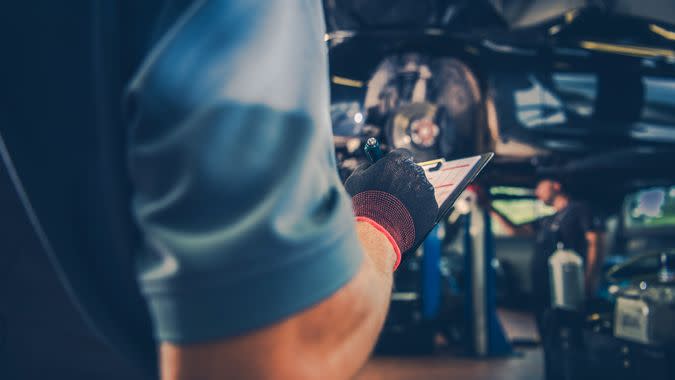
How To Avoid Being Scammed
There are many things a mechanic could lie about to rip you off, but coming prepared can help protect your wallet. Use these tips to avoid being scammed.
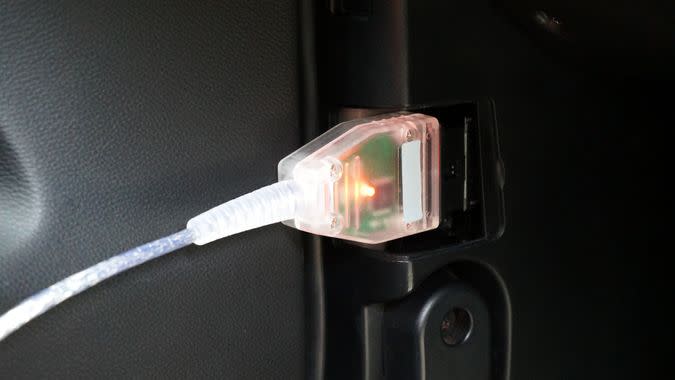
Use an OBDII Scanner To Self-Diagnose the Issue
When dashboard warning lights come on, you can plug an OBDII (On-Board Diagnostic tool) into your car's OBDII port to find out what's wrong. Consider using this first before heading to your mechanic.
"A good OBDII scanner will give you a number of useful tools to help even the most uninformed car owners with things like a description of the problem and common fixes ... even suggestions for parts," said Kameron Scott, founder and owner of CarAudioNow.com.

Do Your Research
If you don't have a trusted mechanic yet, it's important to do your research first. That includes asking for recommendations from friends and family. You should also take some time to research what needs to be repaired before agreeing to any additional work performed on the car.

Pay Attention to Online Reviews
Reading reviews is another smart way to gauge how reliable a mechanic is.
"Personal recommendations from friends are great, but one or two friends are going to have limited experience with the shop," said Lerma. "Read reviews on Google, Yelp, Facebook, etc. — especially the negative reviews. If you see a pattern, that's a bad sign."
"And no business is going to be perfect, but if they respond to negative reviews defensively or without good customer service skills, you can bet that's how they will take care of your problems," he said.
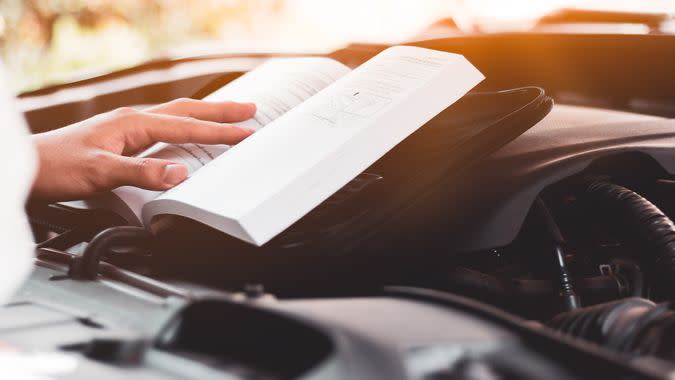
Read the Owner's Manual
Your mechanic might recommend doing routine maintenance such as an oil change or tire rotation on the spot. Make sure you know what exactly your car needs — and when — so you don't pay for unnecessary maintenance. The owner's manual will tell you all the recommended intervals for fluid changes and maintenance items. It's one of the best ways to stay on top of what your car needs.

Phone a Friend
A repair shop can be a high-pressure environment, especially if a mechanic puts you on the spot with pricey recommendations for how to fix a problem. Don't be afraid to tell them you need a moment to consult with a friend or family member before making any decisions. Getting an informed outside opinion can help you choose.
Knowledge Is Power: Essential Tips for Negotiating With Car Dealers

Check an Online Repair Cost Estimator
A mechanic should always ask for your approval before doing any work, said Lerma. If the quote they give you seems high, take a moment to check estimated repair costs online.
"There are repair estimators that take your make, model and year, and give average costs for that repair in your ZIP code," he said. "As long as it's roughly in that range, it's probably fair. But don't assume you're getting a good deal if they quote you a cheaper price. They may be using inferior parts or skimping on an important part of the job."

Take Your Repaired Car for a Test Drive
Don't open your wallet until you know for sure that your car is actually fixed.
"Ask to see the repair and drive with the mechanic after (the repairs are) performed to ensure it is fixed before you pay," said Leutz.
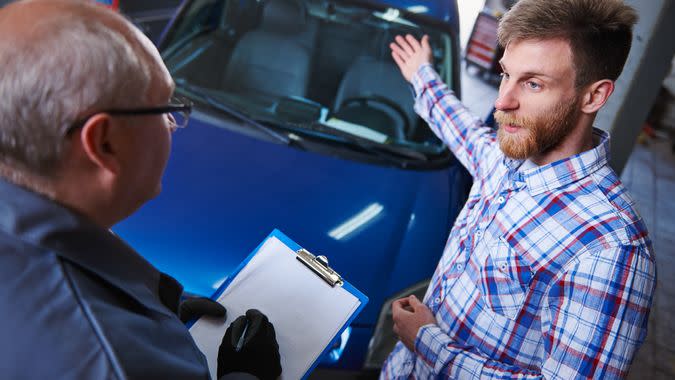
Walk Away
Don't feel pressured to agree to repairs if you think the shop isn't being honest. When in doubt, leave. If you feel like the mechanic might be taking advantage of your lack of knowledge, simply decline the recommended repairs, get your keys back and drive away. You can always consult another mechanic or a knowledgeable friend about it down the line.
More From GOBankingRates
This article originally appeared on GOBankingRates.com: 19 Money Lies Your Mechanic Might Be Telling You
